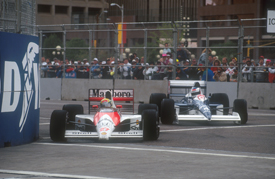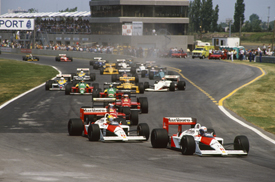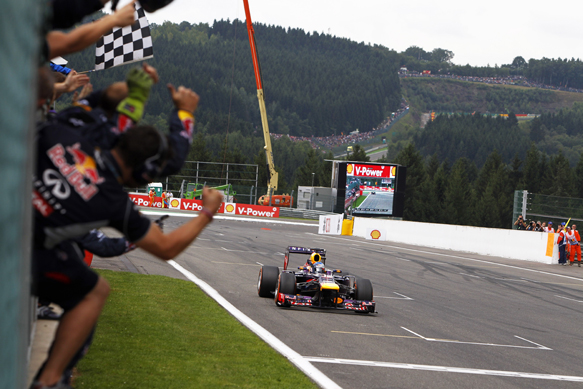Straw’ın yazısını sizlerle paylaşıyoruz.
Sebastien Vettel ve Red Bull’un bu sezon bu sezon ard arda dördüncü duble şampiyonluğu ulaşması kaçınılmaz bir sonuş değil ancak Belçika’daki zaferin ardından bu ihtimal artmış görünüyor.
Vettel/Red Bull birlikteliği doğal bir fenomen olmuş durumda. 2009 yılındaki büyük kural değişiklikleriyle gridin ön bölümüne yerleştiklerinden bu yana, Alman pilot 30 yarış ve 3,5 şampiyonluk kazandı. Bunlara Mark Webber’in kazandığı 9 zafer kupası da eklenince Milton Keynes’teki fabrikanın giriş bölümünde kupalardan bir kule oluştu.
Ancak kaçınılmaz olarak, bunların çok kolay kazanıldığı yönünde gelen çok fazla eleştiri de var.
Son yıllarda böyle aşırı başarılı olması Vettel’in suçu değil.
The idea that simply having Adrian Newey on the payroll is a guarantee of success for Red Bull belittles the amount of work required to transform what was once an embarrassing Jaguar squad into one of the most effective teams in the history of motor racing.
Vettel’in iki şampiyonluğu son yarışta kazanılmış ya da Ferrari ve McLaren
No matter that two of Vettel’s triumphs have come in tense final-race shoot-outs, or that both Ferrari and McLaren have had every chance to deny Red Bull. The sense of inevitability pervades to much the same extent as it would were he winning races by two laps with a metaphorical arm resting on the window sill as he cruises round. Those frustrated by that success appear simply to want to belittle it.
Vettel ile ilgili en etkileyici nokta da
What is most impressive about Vettel is that he has evolved into a driver who can be relied upon to deliver.
The anti-Vettel lobby contends that he can only win from the front. It’s true he has never won from lower than third on the grid (he is the equal of Juan Manuel Fangio in that respect). But those who criticise that perhaps overlook that the frequency of wins from lower starting positions is low.
Excluding the anomalous points-paying Indianapolis 500s of 1950-1960, there have been 878 world championship races staged. Of those, 40.3 per cent – 354 grands prix – have been won from pole.

WINS BY GRID POSITION 1950-2013
Grid Wins Percentage 1st 354 40.3% 2nd 209 23.8% 3rd 111 12.6% 4th 58 6.6% 5th 44 5.0% 6th 33 3.8% 7th 19 2.2% 8th 16 1.8% 9th 4 0.5% 10th 8 0.9% 11th 6 0.7% 12th 3 0.3% 13th 2 0.2% 14th 4 0.5% 15th 1 0.1% 16th 2 0.2% 17th 2 0.2% 18th 1 0.1% 19th - - 20th - - 21st - - 22nd 1 0.1%
Vettel has only started lower than third 11 times since the start of 2010, during which time 69 grands prix have taken place. And one of those was the consequence of an exclusion from third place in Abu Dhabi last year. That’s the kind of qualifying efficiency that impresses those willing and able to appreciate the scale of the feat, but which looks like a foregone conclusion to the watching world.
Occasionally, there is criticism that Red Bull and Vettel go about things in a very clinical way. It’s curious to complain about a racing driver and team trying to win from the front and it is rooted in the ever-dangerous rose-tinted-spectacles arena.

Want to know how many times Ayrton Senna won from lower than third on the grid? Just twice. There’s no crime in that, his career was remarkable, but at times it was monotonous.
As for Michael Schumacher, he did it seven times among his 91 wins, five of which came under regulations forcing a driver to qualify on his starting fuel-load. His famous win from 16th on the grid at Spa in 1995 would never have happened but for rain in qualifying.
Astonishingly, Alain Prost won from fourth or lower 16 times out of 51. Yet he is seen as the arch-calculator, a percentage player, compared with Senna’s Mr Excitement tag. Shows how perception can become skewed. The only statistic that really matters is wins.
Red Bull is not at fault for this predictability. Criticisms about spending are largely meaningless, for success is very often proportional to funding in motor racing. Doubly so when you take into account that some of the teams slinging rocks at Red Bull have themselves outspent rivals to win in the past.
Just as in football, those teams with either a wealthy benefactor or the commercial might to lure mega-buck sponsors thrive. It’s part of the game. Instead, those wanting to point the finger of blame should look to the underachievement of rival outfits. After all, on average the McLaren was the fastest car of 2012 and with better reliability, Lewis Hamilton could have won the title.
When Ferrari was the big beast of the grand prix paddock, it was because it raised the bar to a level that teams like McLaren and Williams could not achieve, certainly not consistently. Speed, reliability, an intensive tyre-development programme with Bridgestone: all perfectly legitimate and damned effective.
In the meantime, Williams, by its own admission, benefitted from a BMW engine at times the best in F1, but wedded to a chassis that was too often so-so. When the bar is raised, it takes time to catch up.

A decade earlier, it was Williams-Renault that dominated, before that McLaren-Honda, and so it goes on. Time gives such steamrollers the appreciation they deserve. Today, McLaren’s 1988 season, during which it was denied a clean sweep of victories only by Senna clashing with Jean-Louis Schlesser’s Williams while lapping him at Monza, is the stuff of legend. At the time, remarkable as the feat was, it was repetitive.
Were we living through it now, Twitter and internet forums would be overflowing with individuals complaining about Senna having it easy. After all, the McLaren MP4/4 was a more dominant machine than the Red Bulls of 2010-13 have been. Best car, best engine: easy.
This is just human nature. That’s why F1 is fortunate to be entering a new rules cycle in 2014. In 2009, Red Bull produced a car with the best fundamental concept. That DNA has underpinned its ensuing cars. Without the double diffuser of 2009, it’s probable that Red Bull would now be gunning for title number five.
But next season, it starts all over again. The team striking the right balance of the best engine and the strongest car concept will be on top. It might be Red Bull, or it might not be. That is, in itself, unpredictable and should ensure the lead-up and the early races of 2014 will be as intriguing as 2010, when a flurry of top-team driver changes and the return of Michael Schumacher generated unprecedented interest in the build-up to the season.
For now, what is vital is that somebody – anybody – makes a fight of it this season. When Vettel won four races on the bounce in Singapore, Japan, Korea and India last season there was a sense of inevitability about his coronation even though Fernando Alonso took it down to the wire. That is something F1 needs to avoid.
It’s time for Mercedes, Ferrari or Lotus to up its game and really make a fight of it.
And if it doesn’t, the blame does not lie with Red Bull.

Bir yanıt yazın